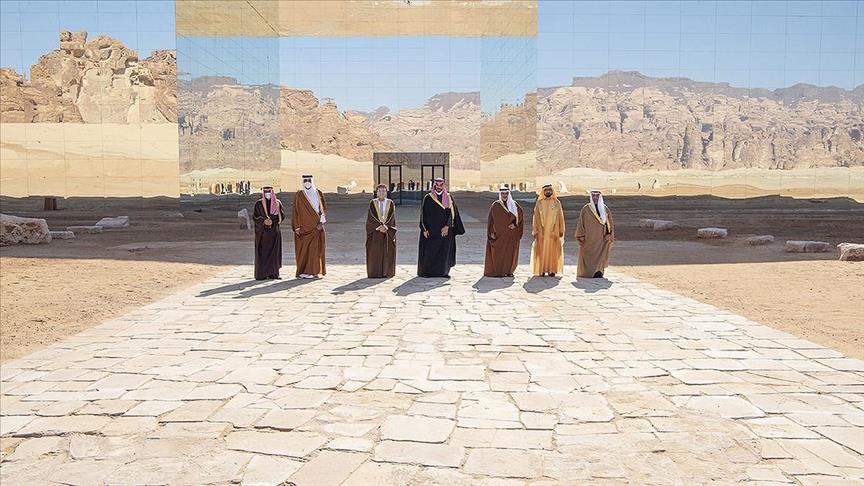The ending of the Gulf crisis will pave the way for new shipping routes, alliances, agreements and energy diversification in the region, Mamdouh Salameh, a visiting professor of Energy Economics at ESCP Europe Business School, told Anadolu Agency on Monday.
Expansion of oil pipeline capacity that bypasses the Strait of Hormuz could also emerge in the event of a blockade to the Strait, Salameh added.
He hailed the lifting of the Saudi-led blockade against Qatar as a real victory for common sense, as it caused a lot of shipping inconvenience for Qatar and added to the shipping costs of its crude oil and LNG to international markets.
'For instance, the United Arab Emirates (UAE) banned Qatar-flagged ships from calling at its Fujairah and also banned vessels at the port from sailing directly to Qatar. Similar restrictions were put in place at Jebel Ali, which prior to the blockade, used to handle over 85% of ship-borne cargo for Qatar,' he explained.
According to Salameh, immediately after the blockade, large cargo ships, which are unable to transport in or out of Qatar entirely, are required to dock at Jebel Ali or other nearby ports where a feeder service transports the goods into Qatar.
However, Qatar, facing heavy financial losses as a result of the blockade estimated at $43 billion, inaugurated the Hamad Port, arguably the largest in the Middle East, less than six months after the blockade, he noted.
'The port played a key role in securing new marine routes and ensuring basic supplies and commodities were made available, and despite the rising cost of shipping its crude oil and LNG, Qatar was able to absorb the additional costs without raising the export prices of its oil and LNG exports to clients,' he said.
Nevertheless, the end of the blockade will save Qatar the extra shipping costs of its oil and LNG exports, and the final agreement will pave the way for energy cooperation between Gulf countries, which have to diversify their economies to avoid oil price volatility.
According to Salameh, Gulf countries need to replace oil and gas with solar power and nuclear energy for the generation of electricity and powering water desalination plants, and also to add value to their exports by exporting a big chunk of their crude oil in the form of refined and petrochemical products.
-Energy flow in Gulf concerns Israel and Egypt
Salameh emphasized that Egypt, which has long been involved in Arab Gulf oil and LNG exports, is essential for the Gulf due to the Suez Canal. In addition, Egypt’s SUMED oil pipeline, which is designed to pump 2.5 million barrels a day of Gulf crude oil from the Ain Sukhna terminal on the Red Sea to the Mediterranean port of Sidi Kerir near Alexandria, plays a major role in oil transfer and trade.
Israel, also a major regional player and a potential competitor to Egypt, is rehabilitating the Eilat-Ashkelon oil pipeline (EAP) to expand its capacity beyond the current 600,000 barrels a day and extending it 700 kilometers southeast to the Saudi oil terminal at Yanbu on the Red Sea.
'While the EAP could enable Saudi oil shipments to bypass both the Straits of the Hormuz and Bab Al-Mandeb and the Suez Canal and be loaded at Yanbu and transported to the Mediterranean, it competes with the Suez Canal and the SUMED pipeline,' he said.
If Gulf oil and LNG producers start to use the EAP, it will deprive the Suez Canal of an estimated 12%-17% of the transited oil trade and cut Egypt's revenues initially by an estimated $12 billion annually.
If this happens, Salameh said that Egypt would have to reconsider its choices and strategic objectives, one of which would be reconciliation with Turkey that could have huge strategic implications not only for the Eastern Mediterranean but also for the Gulf region and Libya.
Joe Macaron, a resident fellow in Arab Center Washington DC, said there were no winners economically in this Gulf crisis, as all parties involved had variant financial losses because of commercial disruption, re-adaptation to new shipment routes, and loss of potential markets.
'All parties involved in the Gulf crisis had to arrange new shipping routes to offset the impact of the border closure, and most probably they might maintain some of these alternative routes to diversify their options,' he said.
In line with these developments, Saudi Arabia is looking to diversify its energy resources and tap into its gas resources, which can benefit from cooperating with Doha in the long term. And Qatar, meeting about 20% of the UAE's gas demand during the blockade, is expected to focus on expanding its LNG liquefaction capacity, according to Macaron.
'There is potential for Qatar to have mutually beneficial gas cooperation with both Saudi Arabia and the UAE, but the parties involved must build trust and think about their energy security,' he said.
Since oil tankers are already increasing their rates to ship crude oil given the political risks in the Gulf and tensions with Iran, it is a challenge that will continue in the foreseeable future, he added.
By Busranur Begcecanli
Anadolu Agency
energy@aa.com.tr


